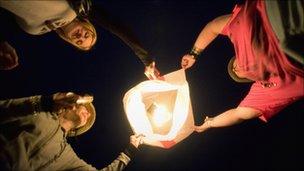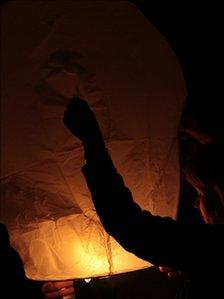Chinese lanterns: Tranquillity masks a threat
- Published

Some 200,000 Chinese lanterns are thought to be unleashed in the UK each summer
Chinese lanterns have brightened up Britain's summer evenings, but have left a coalition of farmers, coastguards and animal lovers furious. Why?
As they float up gently into the night, illuminating the warm skies, it's hard to imagine anything less likely to provoke anger and offence.
Chinese lanterns are cheap, easy to use and, above all, pretty to look at - and over the last decade they have become an increasingly popular sight at weddings, music festivals and even funerals.
The lanterns - effectively, mini-hot air balloons composed of flame, paper and wire - cost as little as £2 each and can travel as far as 30 miles, carried upwards by the heat until they burn out and fall to earth. En route, they glow in the air like Pimms in a Glyndebourne-goer's cheeks.
Only sporadically seen on these shores a decade previously, an estimated 200,000 are now believed to be released each summer across the UK.
But as they drift above the midsummer landscape, not everyone is pleased to see them. Far from it.
Calls for a ban have been circulating, questions have been asked in the House of Commons - parried by the deputy prime minister, no less - and no less an authority than the Marine and Coastguard Agency has warned of their dangers.
What harm could these serenely glowing vessels possibly pose?
According to Britain's agricultural community, a great deal. Citing a surge in livestock killed by eating wire from degraded lanterns which were accidentally picked up by harvest machinery and put into winter feed, the National Farmers Union wants them banned.
The RSPCA has warned that the wire could cause "extreme discomfort" to cattle if ingested. Moreover, arable producers warn that dry, hot fields of crops can be ignited by lanterns.
The problem has become so acute that members of the Women's Food and Farming Union in north-east Wales have staged regular "lantern patrols". Members have also been collecting evidence to send to the government in order to obtain a ban.
One country-dweller who has come to dread the twinkling lights is Jane Treherne, 55, who has farmed 450 acres just outside Northampton with her husband for 31 years.
In a one-month period between February and March the couple say they lost four cattle worth £1,000 each after their feed, harvested the previous summer, became contaminated with lantern wire.
At the peak of lantern season, she says, it is not uncommon to find 10 scattered across her land in a single day.
"I know that they look nice, but we just can't afford to lose that much livestock in a single month."
"It's become a major problem for farmers across the country at a time when money is tight enough as it is. I really think they should be banned."
And it is not only in the countryside that they are encountering hostility. Coastguards warn the lanterns are easily confused with distress flares and have led to an increasing number of unnecessary call-outs as they have become more popular.
According to the Maritime and Coastguard Agency, there were nine "incidents caused by Chinese lanterns" in 2007, 49 in 2008 and 347 in 2009. They have also been blamed for a flurry of UFO sightings.

The industry is introducing biodegradable lanterns
Chinese lanterns have, of course, been around for a long time. Invented in third-century China, they became a symbol of good wishes and used to celebrate special occasions.
Their popularity in the UK is more recent, however, and has been traced to the aftermath of the 2002 Bali bombs, when they were released to pay tribute to the 182 dead.
One politician who has taken up the cause of those aggrieved by lanterns is Richard Bacon, Conservative MP for South Norfolk, who brought the issue to national attention when he raised it at prime minister's questions.
Nick Clegg, standing in for David Cameron, told the Commons that the issue was the source of "a great deal of distress to both farmers and their livestock".
Mr Bacon says he was alerted to the issue by a farmer in his constituency who produced the mangled wreckage of a lantern and invited him to imagine what sort of damage it could cause to his cattle. While the MP - like the government - stops short of echoing the NFU's call for an outright ban, he would like to see the built entirely from biodegradable material.
"No-one wants to be a killjoy, but there has to be an alternative solution," he says.
Indeed, Britain's fledgling Chinese lantern industry insists it is keen to address critics' concerns. Louise Williams of Essex-based Sky Lanterns says her company is going over to an entirely wire-free, biodegradable model fashioned from mulberry paper and a "completely digestible" bamboo rim which burns out before it reaches the ground.
She also urges all lantern-users to alert coastguards before they set them off near the sea - a call echoed by the MCA - but Ms Williams says it would be a tragedy if her product was banned before its teething problems were ironed out.
"We're learning all the time because they're a fairly new product in this country," she admits. "But it would be a shame if we lost them altogether - they create such an atmosphere.
"They're popular at weddings and funerals alike because they can be beautiful in a cheerful kind of way or awesome in a subtle kind of way. It's like a thought being sent up to the heavens."
Britain's farmers will be sending their own prayers skywards that her promise of improvements is borne out.